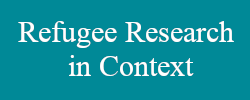RRIC proactively identifies emerging and/or ongoing Issues of forced migration, synthesizes relevant research, and provides analytical Points of Entry to help community members better understand the contexts underlying and influencing contemporary refugee issues.
- Issues are selected for a variety of reasons. For example, some issues have garnered significant public and media attention but merit additional contextualization and analysis. Other key issues have not even registered in public discourse or in the media. We also invite researchers and practitioners to propose pertinent issues (Participate).
- Each Issue includes a brief overview followed by three Points of Entry that offer key analytical perspectives on the Issue and address questions such as: Why is this happening? What is the deeper context and history? What are the implications, responses, and possible remedies?
- Each Point of Entry offers Resources that delve into that aspect of the Issue.
Refugee Research in Context (RRIC) is a knowledge mobilization initiative of the Refugee Research Network (RRN). Knowledge mobilization (KMb) is a concept that frames knowledge as not only produced in and for academia and as valuable through its impact on practice, policy, and public discourse. KMb prioritizes knowledge production and dissemination as reciprocal and collaborative, and aims to make research findings accessible to a range of audiences. Our approach to KMb is motivated by a deeper commitment to the democratization of knowledge, which questions the limits placed on who can create knowledge and who has access to it. To address the serious issues tied to forced migration it is imperative to make space for many worldviews and ways of knowing.
As such, the RRIC values knowledge produced both within and outside the academy. The RRN has a particular focus on enabling access to academic research, which is often impeded by paywalls, opaque language, and format. We also recognize the importance of research outside of the academic realm. This is why we prioritize open access academic articles and grey literature (for example, in-depth media articles, working papers, community-based research, and reports). One of the goals of this project is to contribute to the decolonization of knowledge. Decolonizing knowledge recognizes the impact of Western-centric ways of knowing on the production of knowledge and the exclusion of Other(ed) ways of knowing. This is why we seek to incorporate a range of theoretical, geographical, and linguistic perspectives and resources.
Each RRIC Issue goes through an approval process before it is shared.

